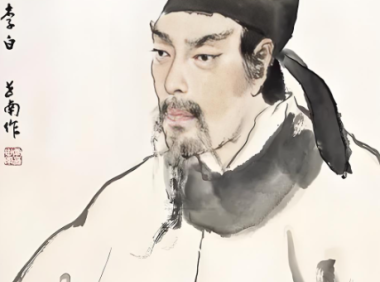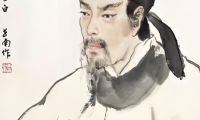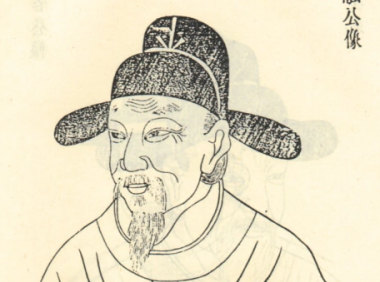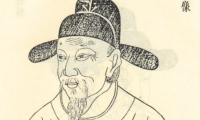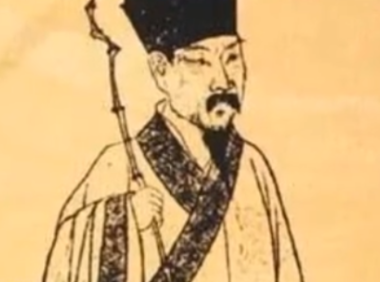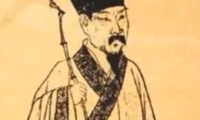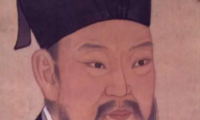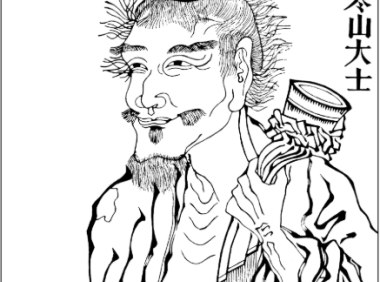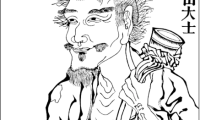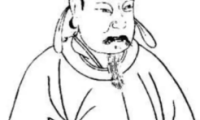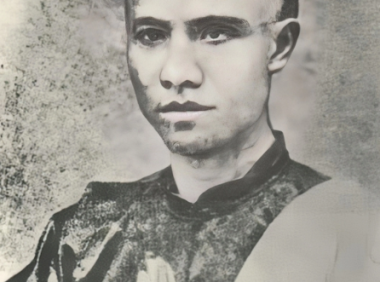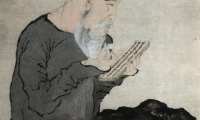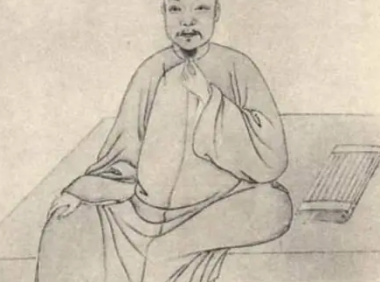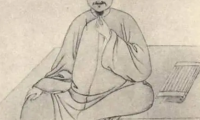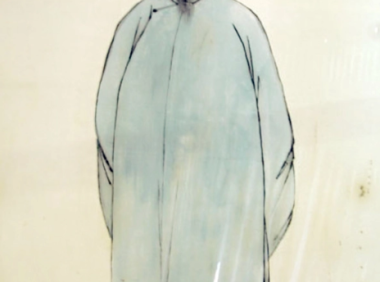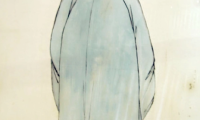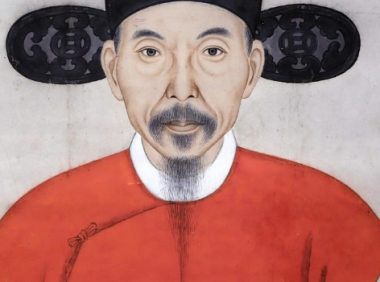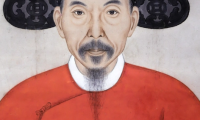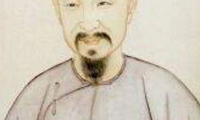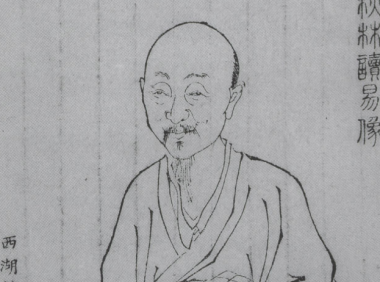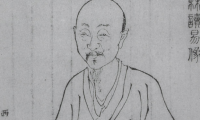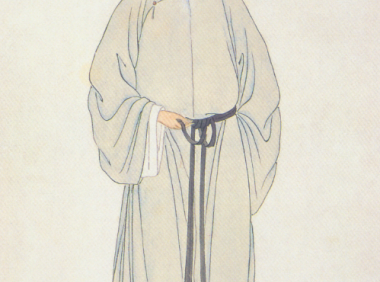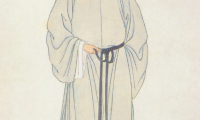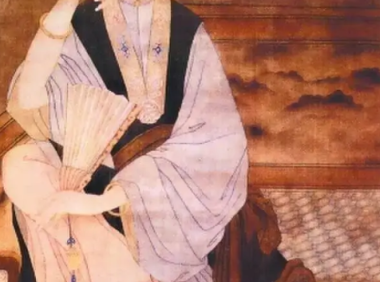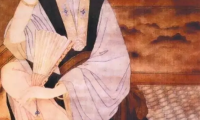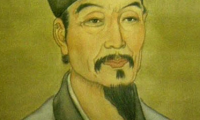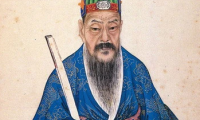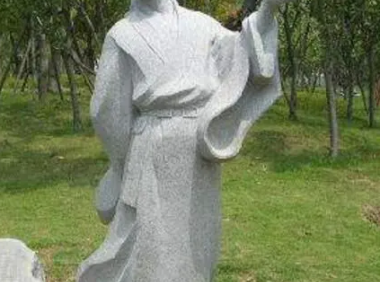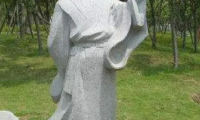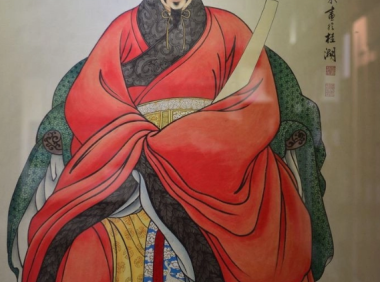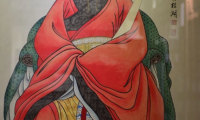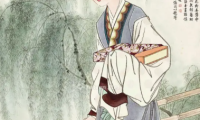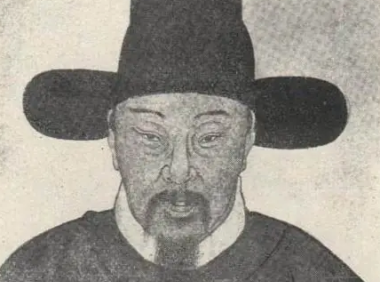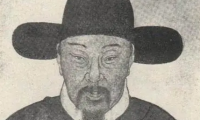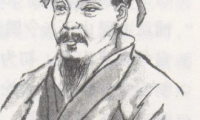-
Li Pai: Evening in the Pavilion of My Friend Tao
libai 宴陶家亭子 李白 曲巷幽人宅,高门大士家。 池开照胆镜,林吐破颜花。 绿水藏春日,青轩秘晚霞。 若闻弦管妙,金谷不能夸。 Evening in the Pavilion of My Friend Tao Li Pai A twisted lane and then we came to the home of this retired one, big gates welcoming us into the larger house of his great family; in front of it water with a beauty that penetrated one’s inmost being, trees and flowers that seemed to smile back at you; green translucent waters as if holding the warm sun of spring, and the house seemed to take in bits of the loveliness of clouds and hold it in its rooms; should one be here and then listen to music from a temple, surely the Golden Valley gardens1 could not compare with it. 1. In the Western Tsin Dynasty (265-316 AD) there were famous gardens called “Golden Valley.” (Rewi Alley 译)...
- 0
- 0
- 80
-
Wu Rong: Poplar Flower
Wu Rong 杨花 吴融 不斗秾华不占红,自飞晴野雪蒙蒙。 百花长恨风吹落,唯有杨花独爱风。 Poplar Flower Wu Rong Vying not for garish tinct nor tinge of rubicund glow, They dance over the field on sunny days like misty snow. Diverse blossoms invariably complain of gusty blow, With ardent love for wind the hearts of poplar flowers alone overflow. (黄龙 译)...
- 0
- 0
- 77
-
Liu Chang: Spring Grass
春草 刘敞 春草绵绵不可名,水边原上乱抽荣。 似嫌车马繁华地,才入城门便不生。 Spring Grass Liu Chang* Grass is profuse and wildly bred. At riverside and on plains it grows at a quick rate. It seems to dislike the places where horses with chariots tread, So it is not seen inside the city gate. * Liu Chang was a poet of the Northern Song Dynasty (10th to 12th century). The poem seems to allude to hermits who dislike city life. (丰华瞻 译)...
- 0
- 0
- 141
-
Zhou Dunyi: The Language of Flowers
爱莲说 周敦颐 水陆草木之花,可爱者甚蕃。晋陶渊明独爱菊;自李唐来,世人盛爱牡丹;予独爱莲之出淤泥而不染,濯清涟而不妖,中通外直,不蔓不枝,香远益清,亭亭静植,可远观而不可亵玩焉。 予谓菊,花之隐逸者也;牡丹,花之富贵者也;莲,花之君子者也。噫!菊之爱,陶后鲜有闻;莲之爱,同予者何人?牡丹之爱,宜乎众矣。 The Language of Flowers Zhou Dunyi Lovers of flowering plants and shrubs we have had by scores, but Tao Yüan-ming alone devoted himself to the chrysanthemum. Since the opening days of the Tang dynasty, it has been fashionable to admire the peony; but my favourite is the water-lily. How stainless it rises from its slimy bed! How modestly it reposes on the clear pool – an emblem of purity and truth! Symmetrically perfect, its subtle perfume is wafted far and wide, while there it rests in spotless state, something to be regarded reverently from a distance, and not be profaned by familiar approach. In my opinion, the chrysanthemum is the flower of retirement and culture; the peony, the flower of rank and wealth; the water-lily, the Lady Virtue sans pareille. Alas; few have loved the chrysanthemum since Tao Yüan-ming; and none now love the water-lily like myself; whereas the peony is a general favourite with all mankind. (Herbert A. Giles 译)...
- 0
- 0
- 92
-
Hanshan: I Considered Painting Two Flowers ~ 寒山·《重岩我卜居》 with English Translations
寒山:唐代著名高僧,长住天台山客岩幽窟中。与拾得、丰干皆隐栖天台山国清寺,故称“国清三隐”。寒山好峰谤唱偈,每有篇句,即题于石间树上。寥山诗有鲜明的乐府民歌风,通俗易懂,机趣昂然,多作佛门警世语。全唐诗汇编成《寒山子诗阜》一卷,收录诗歌三百余首。 Hanshan: a famous Tang Dynasty monk who resided in the secluded caves of Ke Yan on Tiantai Mountain. Along with Shide and Fenggan, they both reside in Guoqing Temple on Tiantai Mountain, hence the name "Guoqing San Yin". Hanshan Haofeng slanders and sings verses, with each sentence inscribed on a tree among the rocks. The poetry of Liaoshan has a distinct style of Yuefu folk songs, which are easy to understand and full of humor, often used as Buddhist warning messages. The entire collection of Tang poems has been compiled into a volume called "Hanshanzi Poetry Collection", which includes more than 300 poems. 寒山·《重岩我卜居》 重岩我卜居,鸟道绝人迹。 庭际何所有,白云抱幽石。 住兹凡几年,屡见春冬易。 寄语钟鼎家,虚名定无益。 I Considered Painting Two Flowers Perhaps wind and rain etch my life in the cliffs, Or the birds record my solitary promenades. My courtyard? Clouds and tumbled stone. Winter melts into forests year by year, And I number each spring quietly. Below me great men cast bronze bells, Carve their names and heroic deeds, and toll Them forth. The silent cliffs echo my character. (Peter Stambler 译) ‘Midst layers of cliffs—the place I divined to live; Up on bird's trails, cut off from the tracks of men. What is there by…...
- 0
- 0
- 61
-
Li Shan-fu: The Temple of Hsiang Yü – 李山甫《项羽庙》with English Translations
李山甫,字明叟,北宋建昌军南城县龙溪保人(今江西省资溪县高阜镇港口村叶源人),汉族江右民系。李山甫是北宋皇祐元年(1049年)进士,任建宁知县。熙宁六年(1073年)从经略安抚使王韶攻取吐蕃占据的河州,因守香子城有功,升为太常博士、河州通判。元丰三年(1080年),王韶以其才可用,荐于朝廷,授作坊使,任澧州。上任前受神宗召见,慰勉有加。在澧州妥善处理了当地少数民族的问题。他积极参加王安石倡导的变法运动,与之交厚,王安石曾赴其家探访,留有《过长山访山甫不遇》诗一首。 Li Shanfu's "Xiangyu Temple" is a Tang poem that depicts the fate and state of mind of Xiang Yu. Through reviewing historical events of Xiang Yu, it expresses the poet's sentiment towards the tragic fate of heroes. 李山甫·《项羽庙》 为虏为王尽偶然,有何羞见汉江船? 停分天下犹嫌少,可要行人赠纸钱? The Temple of Hsiang Yü Li Shan-fu Captive or king, it's all a matter of chance. Why ashamed to see Han boats on the river? Contesting for the empire, the world wasn't big enough; Would you now care for offerings of paper money from a traveler? 1. Hsiang Yü (232-202 B.C), the defeated king of Ch'u. (Irving Y. Lo 译)...
- 0
- 0
- 78
-
Tan Sitong Poem: At Dawn Atop the Highest Peak of the Southern Mountain – 谭嗣同《晨登衡岳祝融峰》
晨登衡岳祝融峰 [清]谭嗣同 身高殊不觉, 四顾乃无峰。 但有浮云度, 时时一荡胸。 地沉星尽没, 天跃日初熔[1]。 半勺洞庭水, 秋寒欲起龙。 注释: [1]天跃日初熔:这句是说天际出现了火红的朝霞,太阳像刚冶炼过的火球,霎时光焰万丈,染红了天边。 At Dawn Atop the Highest Peak of the Southern Mountain Tan Sitong[1] Atop the peak I feel not high; Looking around, I find no crest. I only see clouds floating by Now and then purify my breast. Beyond dark earth stars sink awake; The sun leaps up like molten gold. From half the spoon of Dongting Lake Dragon would rise in autumn cold. 注释: [1]The poet was a reformist put to death at the age of 33. A native of Hunan, he ascended in 1891 the highest peak of the Southern Mountain in his homeland. "Climbing Zhurong Peak of Hengshan Mountain in the Morning" is a five-character regulated verse written by Tan Sitong, a thinker in the Qing Dynasty. The poem describes the scene the author saw when he climbed Zhurong Peak of Hengshan Mountain. The first four sentences highlight the height of Zhurong Peak; the fifth and sixth sentences describe the scene of the night disappearing and the dawn appearing when climbing Zhurong Peak; the last two sentences describe the view of Dongting Lake from the top of the mountain, which is so small that it looks…...
- 0
- 0
- 26
-
Jin Nong Poem: The Willow – 金农《柳》
柳 [清]金农 销魂桥[1]外绿匆匆, 树亦销魂客送空。 万缕千丝生便好, 剪刀谁说胜春风。 注释: [1]销魂桥:唐时指灞桥,在陕西西安市长安区东。因远行者与送别者常于此惜别,故称。 The Willow Jin Nong Beyond Heart-broken Bridge the willows green in haste; When friends are gone away, heart-broken are the trees. Thousands of branches wave like dancer's slender waist; Could scissors cut more slender leaves than vernal breeze?...
- 0
- 0
- 36
-
Li E Poem: In Lakeside Pavilion– 厉鹗《湖楼题壁》
湖楼题壁 [清]厉鹗 水落山寒处, 盈盈[1]记踏春。 朱栏[2]今已朽[3], 何况倚栏人! 注释: [1]盈盈:形容动作轻盈。 [2]朱栏:红色的栏杆。 [3]朽:腐蚀,朽烂。 In Lakeside Pavilion[1] Li E The hills look cold when water falls, ’Tis vernal joy my heart recalls. The balustrade's no longer red, My love who leaned on it is dead. 注释: [1]This quatrain was written in memory of the poet's fair mistress who died at the age of 24 and was buried by the lakeside. "Wall of Lake Tower" is a five-character quatrain written by Li E in the Qing Dynasty. The first two lines of the poem evoke beautiful memories of the past by describing the current desolate scenery. The last two lines describe the decayed lake tower in front of the poet, expressing his deep feelings about the rise and fall of the world and the aging of life. The poem uses allusions without leaving any trace, which makes the poem contain philosophy and shows true feelings....
- 0
- 0
- 12
-
Zheng Xie Poem: Written on a Picture of Bamboo – 郑燮《潍县署中画竹呈年伯包大中丞括》
潍县[1]署中画竹潍县署中画竹呈年伯包大中丞括 [清]郑燮 衙斋[2]卧听萧萧[3]竹, 疑是民间疾苦声。 些小[4]吾曹[5]州县吏, 一枝一叶总关情[6]。 注释: [1]潍县:今山东潍坊市。 [2]衙斋:官署书房。 [3]萧萧:竹枝摇动的声音。 [4]些小:小小,指官职卑微。 [5]吾曹:我辈。 [6]关情:牵动感情。 Written on a Picture of Bamboo[1] Zheng Xie I listen in my office to rustling bamboo; It seems to complain of its woe as people do. Petty official, I should try to play my part; To ease shivering leaf as sorrow-laden heart. 注释: [1]This quatrain was written on a picture drawn by the poet for Governor Bao. "Painting Bamboo in Weixian County Office Presented to My Uncle Bao Dazhong Cheng Kuo" is a seven-character quatrain written by the Qing Dynasty poet Zheng Xie. The poem first describes the sounds heard in the county office one night, then associates it with the suffering of the people, and finally expresses the poet's ambition to take the people's livelihood as his own. The poem uses metaphors to reveal the poet's deep concern for the fate of the people....
- 0
- 0
- 26
-
Qu Dajun Poem: Before the Flowers – 屈大均《花前》
A five-character regulated verse written by the poet Qu Dajun in the late Ming and early Qing dynasties...
- 0
- 0
- 14
-
Kong Shangren Poem: The Grand River Viewed from the Northern Mountain – 孔尚任《北固山看大江》
北固山[1]看大江 [清]孔尚任 孤城铁瓮[2]四山围, 绝顶高秋坐落晖[3]。 眼见长江趋大海, 青天却似向西飞。 注释: [1]北固山:山名,在今天江苏省镇江市以北,三面临江。 [2]铁瓮:镇江城的别名。 [3]坐落晖:坐在夕阳中。落晖,夕阳。 The Grand River Viewed from the Northern Mountain Kong Shangren[1] The lonely iron-clad town's girt by mountains high; Viewing autumn sunset, I sit on mountain crest. So fast the endless River's eastwards running by; It seems the azure sky were flying to the west. 注释: [1]Kong Shangren was a playwright, author of Peach Blooms Painted with Blood. "Watching the Yangtze River from Beigu Mountain" is a seven-character quatrain written by Kong Shangren, a poet in the Qing Dynasty. The first two lines of the poem describe "Beigu Mountain", which gives a sense of tranquility, and the writing is very precise and mature; the last two lines describe the Yangtze River, which is a flying momentum, which is the warning point in the poem. The whole poem combines movement and stillness, and uses stillness to set off movement; the conception is unique, and it writes out the magnificent scenery that is in the heart but not in the pen....
- 0
- 0
- 10
-
Shi Runzhang Poem: Snow Scene Viewed from the Pavilion – 施润章《雪中阁望》
"View from the Pavilion in the Snow" is a poem written by Shi Runzhang in the Qing Dynasty....
- 0
- 0
- 14
-
Qian Qianyi Poem: View from the Garden of Ding – 钱谦益《留题秦淮丁家水阁》
留题秦淮丁家水阁 [清]钱谦益 苑外杨花[1]待暮潮, 隔溪桃叶[2]限红桥。 夕阳凝望春如水, 丁字帘[3]前是六朝。 注释: [1]苑外杨花:表面上写丁家花园外的杨柳,暗指钱谦益的爱妾柳如是。 [2]桃叶:桃叶渡,在南京市秦淮河与青溪合流的地方。 [3]丁字帘:地名,在南京市利涉桥畔。明末为妓女聚居的地方。 View from the Garden of Ding Qian Qianyi[1] The willow down afield waits for the evening tide; A painted bridge leads to Peach Leaf by riverside. At sunset water-limpid spring attracts my gaze. O where's the splendor of the Six Dynasties days! 注释: [1]Qian Qianyi was one of the first Ming scholar-officials who declared his allegiance to the Qing conquerors, and was then accused of plotting against the Qing emperor. "Leaving a Poem at the Ding Family Pavilion in Qinhuai" is a seven-character quatrain written by the Qing Dynasty poet Qian Qianyi. The poem mainly describes the scenery and waterscape of the historic city of Jinling viewed from the Ding Family Pavilion. As a thousand-year-old capital, Jinling is full of spring scenery; but although the spring scenery remains the same, the Qinhuai River, which was once bustling with singing and dancing, is now desolate in front of the Dingzi curtain. The description of the spring scenery and dusk expresses the poet's regret for the late Ming Dynasty....
- 0
- 0
- 20
-
Qian Qianyi Poem: The Orchid Flower – 钱谦益《咏同心兰》
"Four Quatrains in Ode to the Orchid of the Same Heart" is a seven-character quatrain by Qian Qianyi, a poet of the Qing Dynasty....
- 0
- 0
- 38
-
Liu Rushi Poem: West Lake – 柳如是《西湖》
西湖 [清]柳如是 垂杨小院绣帘东, 莺阁残枝蝶趁风。 大抵西泠[1]寒食路, 桃花得气美人中。 注释: [1]西泠:亦称“西陵桥”或“西林桥”。在杭州孤山西北尽头处,是由孤山入北山的必经之路。 West Lake Liu Rushi[1] The weeping willows stand east of the curtained bowers; Orioles and butterflies pass through the faded flowers. But peach blossoms on Cold Food Day are beautified By beauties living or buried by the lakeside[2]. 注释: [1]The poetess was first in love with Chen Zilong who resisted the Qing conquerors and drowned himself when defeated. At last, she was wedded to Qian Qianyi. [2]General Yue Fei was the hero and Su Xiaoxiao and Feng Xiaoqing were beauties buried by the side of West Lake. Liu Rushi, a female poet in the late Ming and early Qing dynasties, was born Yang Ai, with the courtesy name Rushi, also known as Hedong Jun. She named herself Rushi because she read the poem "He Xinlang" by Xin Qiji of the Song Dynasty: "I see the green mountains are so charming, I guess the green mountains see me like this", and was born in Jiaxing, Zhejiang. Liu Rushi is one of the "Eight Beauties of Qinhuai". She was smart and studious since childhood, but because of her poor family, she was abducted and sold since she was a child, and traveled between Jiangsu,…...
- 0
- 0
- 108
-
Wu Chengen Poem: The Autumn Moon – 吴承恩《对月感秋》
Wu Chengen Wu Chengen(1500-1582) Ming novelist. Born in Shanyang, with the courtesy name Ruzhong and the pseudonym Sheyang Shanren. He suffered repeated setbacks in the imperial examinations. He was appointed as a tribute student in the Jiajing period and later served as the magistrate of Changxing County in Zhejiang. He was ashamed to bow down for a few grains of rice, so he left the country and devoted himself to writing. He liked to read wild stories and strange novels since he was a child. He was good at making jokes. In his later years, he wrote "Journey to the West", which tells the story of the Tang monk Xuanzang's journey to the West. He also has "Sheyang Xiansheng's Manuscripts" and "Yu Ding Zhi". 对月感秋 [明]吴承恩 人云天上月, 中有嫦娥居。 孤栖[1]与谁共? 顾兔并蟾蜍。 冰轮[2]不载土, 桂树无根株[3]。 纷纷黄金粟[4], 岁岁何由舒[5]? 一闭千万年, 玉颜[6]近何如? 相违不咫尺[7], 照我阑干偶。 一杯劝尔酒, 为我留须臾[8]。 注释: [1]孤栖:孤孤单单地栖居。 [2]冰轮:圆月。 [3]无根株:此句指的是那高耸月宫的桂树不生枝干。 [4]黄金粟:代指桂花。 [5]舒:舒发,生长。 [6]玉颜:美丽的容颜。 [7]咫尺:比喻距离很近。 [8]须臾:片刻,一会儿。 The Autumn Moon[1] Wu Chengen[2] ’Tis said a fair lady on high Resides in the moon up the sky. With whom her solitude to share? An ugly toad and a jade hare. On icy moon there is no clay; The rootless laurel tree can't stay. How can its golden grains appear…...
- 0
- 0
- 32
-
Yang Jisheng Poem: On Mount Tai – 杨继盛《登泰山》
登泰山 [明]杨继盛 志欲小天下, 特来登泰山。 仰观绝顶上, 犹有白云还。 On Mount Tai Yang Jisheng[1] The world's small east to west When I climb mountains high. I look up from the crest: Higher white clouds sail by. 注释: [1]Yang Jisheng was minister of war sentenced to death for he impeached the prime minister of treason. Climbing Mount Tai is a poem by Yang Jisheng of the Ming Dynasty. The meaning of this poem is: Because of the ambition of "wanting to look down on the world", I specially climbed Mount Tai. The meaning of this poem is: Because of the ambition of "wanting to look down on the world", I specially climbed Mount Tai. After climbing to the top of Mount Tai and looking up, I saw that there were still leisurely white clouds on the top of Mount Tai, traveling between the vastness of space....
- 0
- 0
- 37
-
He Jingming Poem: Song of the Autumn River – 何景明《秋江词》
"Autumn River Lyrics" is an ancient folk song written by He Jingming, a poet of the Ming Dynasty....
- 0
- 0
- 18
-
Yang Shen Poem: The Willow – 杨慎《柳》
柳 [明]杨慎 垂杨垂柳管[1]芳年[2], 飞絮飞花媚远天[3]。 金距斗鸡[4]寒食后, 玉蛾[5]翻雪暖风前。 别离江上还河上, 抛掷[6]桥边与路边。 游子魂销青塞[7]月, 美人肠断翠楼烟。 注释: [1]管:负责,这里指杨柳最先抽芽,迎来春天。 [2]芳年:美好的春天。 [3]媚远天:将春天点缀得更加妩媚。 [4]金距斗鸡:这里指柳树刚冒出的嫩黄色新芽,就像人们在斗鸡时套在鸡脚上的距刺。 [5]玉蛾:这里比喻一团一团的柳絮。 [6]抛掷:丢弃、弃置。 [7]青塞:边塞、边地。 The Willow Yang Shen[1] The weeping willow tree o'er fragrant spring holds sway; Its yellow sprout looks like gold claw on Cold Food Day.[2] Flower-like willow down enchants the boundless sky; It flies like snow or moth of jade in warm wind high. It weeps on seeing people part on river wide; Its broken twigs are cast by the bridge or roadside. My heart breaks 'neath the moon on willowless frontier; Severed by willow screen, my love sheds tear on tear. 注释: [1]The poet won the first honor in imperial exam of 1511, and was banished to Yunnan for over thirty years. [2]On Cold Food Day Chinese people used to take cold meals and visit their ancestral graveyard. "Willow" is a seven-character regulated verse written by Yang Shen, a poet in the Ming Dynasty. The first couplet of this poem describes how the willow turns green early in the spring, ahead of the wind; the second couplet uses seasonal scenery related to the willow to continue to exaggerate the posture and appearance of the willow in spring; the third couplet takes a…...
- 0
- 0
- 32
-
Huang E Poem: To My Husband – 黄峨《又寄升庵》
"Another Letter to Sheng'an" is a poem written by Huang E in the Ming Dynasty....
- 0
- 0
- 31
-
Gao Qi Poem: Husking Rice – 高启《田舍夜舂》
田舍夜舂 [明]高启 新妇舂粮[1]独睡迟, 夜寒茅屋雨来时。 灯前每嘱儿休哭, 明日行人要早炊。 注释: [1]舂粮:捣米备粮。 Husking Rice Gao Qi The wife is husking rice till late into the night, Alone in thatched cottage cold with wind and rain. She tells her baby not to cry by candlelight, For early risers need their meal to start again. "Night Pounding in the Farmhouse" is a seven-character quatrain written by Gao Qi, a poet in the late Yuan Dynasty and early Ming Dynasty. The first line of the poem describes a young woman working late at night to make spring crops; the second line describes the living environment; the third line describes how the young woman needs to make spring crops while taking care of her child, and how she is worried that her son will get sick from crying and that he will disturb her husband's sleep; the last line answers the first three lines. This poem uses plain language to bring to life the image of a hardworking, simple, and virtuous young woman in a farmhouse with just a few words....
- 0
- 0
- 15
-
Wang Mian Poem: On Mume Blossoms – 王冕《应教题梅》
应教题梅 [元]王冕 刺刺[1]北风吹倒人, 乾坤[2]无处不沙尘。 胡儿冻死长城下, 谁信江南别有春。 注释: [1]刺刺:拟声词,形容风声之大。 [2]乾坤:天地之间。 On Mume Blossoms Wang Mian When the violent northern wind blows, man would fall; There is no place on earth but overspread with sand. The Tartars frozen to death beneath the Great Wall, Who knows mume blossoms still bring spring to southern land? The poem "Ying Jiao Ti Mei" is a seven character quatrain created by the painter and poet Wang Mian during the late Yuan and early Ming dynasties. The title of this poem is "Inscription on Plum Blossoms", but it does not start with plum blossoms. The first two lines of the poem first depict a cold winter scene: hunting the west wind, dust everywhere; The last two sentences have a double meaning, saying that in the cold land of the Great Wall in the north, the defenders of the Yuan and Mongolian dynasties almost froze to death, while the wintersweet in the south had already bloomed. The entire poem cleverly depicts the political situation at that time through metaphors, without deviating from the theme of singing plum blossoms. It expresses the power of plum blossoms to resist the cold and sandstorms, bringing spring to the world, and the…...
- 0
- 0
- 28
-
Wang Mian Poem: To Mume Blossoms – 王冕《梅花》
The Plum Blossom "is a seven character quatrain created by Wang Mian, a famous painter, poet, writer, and calligrapher of the Yuan Dynasty....
- 0
- 0
- 30













